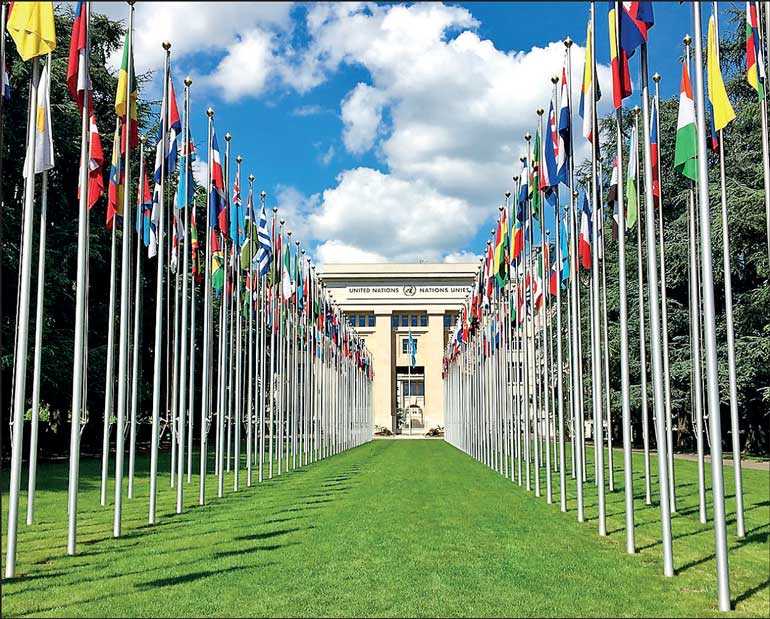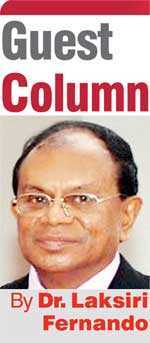Tuesday Feb 17, 2026
Tuesday Feb 17, 2026
Friday, 19 March 2021 00:00 - - {{hitsCtrl.values.hits}}

The failure of the UN to promote human duties, alongside human rights, appear to be a major reason for the increasing conflicts, violence, chaos, and wars not only in developing countries but increasingly in the developed societies
 Motion and advocacy by the UN has come to a crisis point today not only because of the coronavirus pandemic, but also due to the weakening of the democratic states throughout the world with neoliberal economic and political deviations. Apart from the failures, the culpability of the UN and some of its agencies are very clear under the circumstances.
Motion and advocacy by the UN has come to a crisis point today not only because of the coronavirus pandemic, but also due to the weakening of the democratic states throughout the world with neoliberal economic and political deviations. Apart from the failures, the culpability of the UN and some of its agencies are very clear under the circumstances.
Since last year, the coronavirus pandemic has hit very hard at countries where people, particularly the youth, have been groomed with unlimited freedoms without any sense of duty. Many young people opted to resist or question lockdowns and other restrictions as invasions on their freedoms. In countries where public health services had been cut down as part of the dismantling of the ‘welfare state,’ the death tolls were extremely high. America’s death toll exceeded half a million by the end of the last year. Who is responsible for these deaths? No UN shenanigan has answered this question.
Britain, Italy, France, and other EU countries were among the next hardest hit. Those are the countries where protest marches and resistance loomed against lockdowns. Of course, some southern countries were not spared. India also was one of the hardest hit countries. Brazil at present experiencing extremely difficult conditions with chaos, lack of appropriate medications and hospital beds. Although some vaccinations have been developed by researchers and pharmaceutical companies, their effectiveness is still not clear.
The idealistic globalisation has collapsed with the enforcement of lockdowns and boarder restrictions between and within countries. Now several variants of the virus have emerged while countries are scrambling over limited vaccine supplies. The ‘vaccine nationalism’ among the Western countries is now rampant, the poor countries being virtually left out.
This is the immediate background within which the so far Western promoted human rights notions and approaches of the UN should be scrutinised and critically assessed.
Lopsided UDHR?
It was completely short sighted for the UN to highlight individual freedoms and rights without equally emphasising human duties and responsibilities in the Universal Declaration of Human Rights (UDHR) and in the two International Covenants on Civil and Political Rights (ICCPR) and the Economic, Social and Cultural Rights (ICESCR). With the good intervention of the Soviet Union, there was a possibility of striking some balance between civil and political rights on one hand, and economic, social, and cultural rights on the other. But for some reason, the balance between rights and duties was virtually lost except in some corners of the international conventions.
During the preparations and consultations for the UDHR, then UNESCO Director, Julian Huxley, sent a request to Mahatma Gandhi, among others, to seek his views. In May 1947, while busily travelling in a train, Gandhi wrote back a succinct reply giving his vision. The following was its essential part: “I learnt from my illiterate but wise mother that all rights to be deserved and preserved came from duty well done.”
Gandhi further exchanged views with H. G. Wells who was also involved in the consultation process for the UDHR and said: “Received your cable. Have carefully read your five articles. You will permit me to say you are on the wrong track. I feel sure that I can draw up a better charter of rights than you have drawn up. But what good will it be? Who will become its guardian? …Begin with a Charter of Duties of Man and I promise the rights will follow as spring follows winter. I write from experience….”
No one needs to accept what Gandhi said as the absolute truth. But it was a strong view particularly in Asia and the Pacific which should not have been neglected. Even today, there is a great divide between the East and the West on this matter, but the Westerners try to ignore and impose their views.
Neglect of duties
At a UNESCO meeting held in Malta in 1987 on Human Rights Education, I asked one of the main drafters of the UDHR, John Humphrey, whether they had taken Mahatma Gandhi’s views into consideration. He pointed out Article 29 but later admitted to me in Geneva that it might not be what Gandhi completely meant. Article 29 of the UDHR says the following.
(1) Everyone has duties to the community in which alone the free and full development of his personality is possible.
(2) In the exercise of his rights and freedoms, everyone shall be subject only to such limitations as are determined by law solely for the purpose of securing due recognition and respect for the rights and freedoms of others and of meeting the just requirements of morality, public order and the general welfare in a democratic society.
(3) These rights and freedoms may in no case be exercised contrary to the purposes and principles of the United Nations.
The above was not sufficient. It is not only for the ‘full and free development of personality’ that duties should be promoted (2.1). Duties are moral obligations. The other two sections (2.2 & 2.3) have placed duties completely in a negative manner. There is a positive and a dialectical interconnection between human rights and human duties.
If we take what Gandhi said as an Asian or a different view, there was no question that drafters could have find a middle way between, if they wanted. But that was not the case. Although 29 (1) says, ‘everyone has duties to the community’ what are they? The UDHR or the International Covenants never explained them. Why? The predominance of the Western views in the UN drafted human rights.
Let us take the principal article of the UDHR, Article 1. It says, “All human beings are born free and equal in dignity and rights. They are endowed with reason and conscience and should act towards one another in a spirit of brotherhood.”
Of course, to say, ‘all human beings should act towards one another in a spirit of brotherhood’ is a good one. But to say, ‘all are born free and equal in dignity and rights’ is bit of a lie! There are so many inequalities and disparities when we are born, and no doubt that we should change them. It is a long struggle. Even in the British royal family these disparities have surfaced today!
In ideal terms, equality should be the case. But it is not the reality. Without such a lie or idealism, it should have been said differently. Gandhi’s views or Asian views should have been taken into proper account in drafting the UDHR. Realism should be our guide in human rights promotion and protection. Otherwise, we easily get into political traps. One formulation could have been the following.
“All human beings are of the same human family (Homo sapiens) and should treat each other with dignity and equality. In a democratic polity, they all should have equal rights, and equal duties to each other and to the community. In exercising and performing both rights and duties, they should act on reason and conscience guided by the rule of law and should act towards one another in a spirit of brotherhood.”
Conclusion
Human rights and human duties are largely interdependent and interrelated. When there is a right (rights holder), there is a corresponding duty (duty bearer). In a democratic society, the state and the government/s are the primary duty bearers. However, the duties go beyond. In respect of child rights, for example, parents are the primary duty bearers. In respect of women’s rights, all men are the primary duty bearers.
There are duties on the part of the rights holders when they exercise their rights, not to abuse them. These are also called responsibilities. People should be educated and trained to exercise their rights in a responsible and a nonviolent manner.
There are duties on the part of human beings independent from rights, or whether they have rights or not. Respect for other human beings, protection of the environment, and caring for other animals are some of them. The disrespect for these duties could be catastrophic for human beings with environmental disasters, global warming, and pandemic diseases.
Human needs and aspirations are the basis of human rights. Human conscience and morality should be the basis of human duties. Both should go hand in hand. The failure of the UN to promote human duties, alongside human rights, appear to be a major reason for the increasing conflicts, violence, chaos, and wars not only in developing countries but increasingly in the developed societies.